Why Are More US States Banning TikTok?
TikTok's CEO will testify before Congress over the app's privacy and data security.

TikTok continues to receive pressure from the US government over security concerns. Late last year, the director of the FBI said the social video app is a national security threat, and some in the Biden administration were reportedly pushing TikTok's owners to sell its US operations. On Monday, a House of Representatives committee said that TikTok CEO Shou Zi Chew will testify at a hearing in March.
On the state level, governors continue to ban TikTok, citing issues with privacy and data security. Earlier this month, Ohio Gov. Mike DeWine and New Jersey Gov. Phil Murphy banned the app from state-owned devices. Virginia Gov. Glenn Youngkin issued an executive order last month banning TikTok and Chinese social media app WeChat from state-run devices and wireless networks.
Georgia Gov. Brian Kemp released a similar order in December banning TikTok from state government devices.
TikTok said last month it's disappointed by the actions of some state and federal officials. A spokesperson said in an email that the company is ready to put in place solutions developed under the guidance of national security agencies "to further secure our platform here in the United States."
Indiana Attorney General Todd Rokita filed two lawsuits against TikTok in early December. The first alleges that the platform "lured children" into content on the app that contained sexual content, profanity or drug references. In the second lawsuit, the state claims TikTok, which is owned by Beijing-based ByteDance, has personal info and sensitive data of Indiana consumers and deceives them into believing their data is protected from the Chinese government.
"With this pair of lawsuits, we hope to force TikTok to stop its false, deceptive and misleading practices, which violate Indiana law," Rokita said in a press release.
TikTok says the privacy and security of its community are a top priority.
"We build youth well-being into our policies, limit features by age, empower parents with tools and resources, and continue to invest in new ways to enjoy content based on age-appropriateness or family comfort," a TikTok spokesperson said in an email. "We are also confident that we're on a path in our negotiations with the US government to fully satisfy all reasonable US national security concerns, and we have already made significant strides toward implementing those solutions."
Texas Gov. Greg Abbott also took action against TikTok in early December calling for state agencies to ban their employees from downloading or using the app on devices such as phones, tablets and laptops. He then ordered the Texas Department of Public Safety and Department of Information Resources to make a plan to address vulnerabilities presented by using TikTok. He also wrote a letter to state lawmakers about implementing cybersecurity reforms in the upcoming session.
"TikTok harvests vast amounts of data from its users' devices -- including when, where, and how they conduct internet activity -- and offers this trove of potentially sensitive information to the Chinese government," Abbott wrote in a letter.
A TikTok spokesperson says bans of the app are "largely fueled by misinformation about our company."
In 2020, the Trump administration banned TikTok from many government-issued phones and the military. Since then, the Biden administration has upheld that ban while investigating the app. The CIA confirmed in 2020 that user info could be intercepted by the Chinese government, but there was no indication of that happening.

